Your Refrigerator Making a Clicking Noise? 5 Reasons
Author: Omar Alonso | Editor: Omar Alonso
Review & Research: Jen Worst & Chris Miller

Did you open the fridge to grab a soda, only to find it's warm? You stand there wondering if you unplugged it by accident and noticed your refrigerator making a clicking noise. What's causing the problem, and can you fix it?
There could be several reasons why the fridge is making a clicking sound. Unfortunately, they aren't easy fixes, and you might have to send the fridge in for an expensive repair. This post unpacks four common reasons why the refrigerator makes a clicking sound and what to do about it.
5 Reasons for the Clicking Noise in Your Refrigerator
There are four common faults involved with any types of refrigerators making a clicking noise. The sound may come from the compressor, condenser coils, condenser fan, or the start relay.
Identifying which problem you're dealing with depends on whether the fridge is still cooling its contents. Here are the four common faults involved with the clicking and ineffective cooling of your fridge.
Issue #1 – Failed or Faulty Compressor
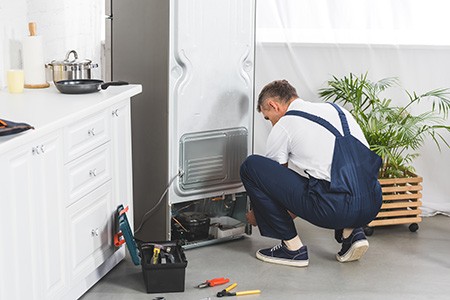
The fridge uses the compressor to compress the coolant gas, keeping your fridge cool. If there's an issue with the compressor, it produces the classic refrigerator clicking noise because the compressor unit is malfunctioning, and you'll need to replace it.
If the compressor is the source of the problem, you'll notice that the fridge isn't cooling properly. You'll see condensation on the fridge's interior and no cooling or lower levels of cooling than what you normally experience.
The compressor runs around 95% of the time in modern, energy-efficient fridges and about 50% of the time on older units. Most of the energy consumed by the compressor comes from turning it on and off, so by leaving it running, you get better energy efficiency, despite it running for longer.
If the compressor constantly turns on and off, you'll hear clicking when it does. The problem could be overheating, power overloads, overloaded refrigerator extension cords, blocked air vents, or something as insignificant as the fridge light remaining on when you close the door.
Fixing or Replacing the Clicking Compressor
It's challenging to inspect and repair the compressor's components if you don't have any experience working with these appliances. So, if the fridge is clicking and failing to cool the contents, call a professional to look at it. They'll diagnose the problem and recommend repairing or replacing the compressor.
Issue #2 – Dirty or Faulty Condenser Coils
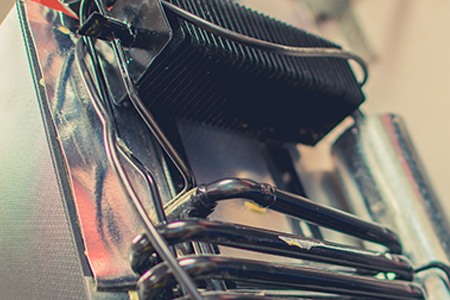
The compressor compresses the gas responsible for cooling the fridge. After undergoing compression, the gas moves along the condenser coils dissipating the heat so the compressor can compress it again.
The process is effective and efficient, but dirty or faulty condenser coils can impact the cooling capacity of the fridge and create a clicking sound. If the condenser coils are dirty, they won't work efficiently and could be the cause of your refrigerator making a clicking noise.
They can't dissipate heat effectively, and the dirt creates a barrier preventing the coils from distributing the heat from the gas. When the fridge stops working efficiently, it increases its operation of the compressor, and the clicking sound you hear is the compressor motor repeatedly turning over.
Under normal operating circumstances, the compressor efficiently cools the fridge, so it won't have to run as often.
Cleaning or Replacing Dirty Condenser Coils
If you have dirty condenser coils in your fridge causing the clicking problem, you can use a condenser brush (available from a hardware or plumbing store) to clean the coils. Otherwise, you can open the area housing the coils and clean them with a microfiber cloth and vacuum cleaner.
Remember to unplug the clicking refrigerator before cleaning it to prevent an electrical hazard. The coils in mini-fridges are usually at the bottom of the fridge (which is why it's important to never run a mini-fridge on a carpeted surface) or in the back of the refrigerator for larger models.
Use your condenser brush to get between the coil bends and thoroughly clean them off. If you're using a cloth and vacuum and cloth instead, use the hose attachment to suck up the dust and follow up with a dry, clean cloth to remove any remaining dirt and debris.
Issue #3 – Faulty Condenser Fan
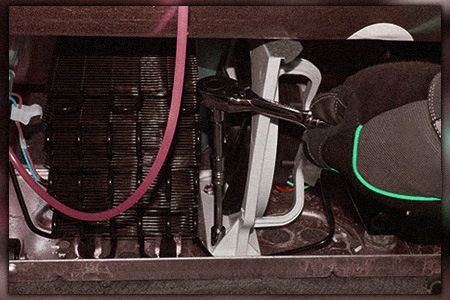
If you notice your fridge cooling efficiently but the refrigerator is clicking, the culprit might be the condenser fan. It's also common for people to interpret this sound as a scraping noise. The condenser fan blows cool air over the coils (just like in any types of air conditioners) to assist with efficiently cooling the compressed refrigerant gas as it absorbs heat from the system.
There are a few issues with condenser fans that might cause the problem. They may jam, or the blades may bend and click or scrape against other parts in the appliance housing. Or, the fan may stop working altogether, resulting in dysfunctional cooling of the coils, more stress on the compressor, and failed compressor operation. This can be the reason your refrigerator is freezing food.
Fixing a Clicking Condenser Fan
To identify that the fan is the source of the clicking noise in the refrigerator, pull the fridge away from the wall and open the rear access panel to the coils and condenser fan. You'll find the fan next to the coils; if it's not moving, try turning it with your fingers. Does the fan spin easily, or does it make a scraping or clicking sound?
If it reproduces the sound, look to see if the blades are bent out of shape. You might get away with bending them back into the correct place, but there's no guarantee this will work. In most cases of this problem, you'll need to replace the fan.
Replace the rear panel and plug the fridge in to see if the fix worked. If the condenser fan doesn't turn, or you notice the clicking sound coming from the compressor, the compressor is the most likely culprit.
Contact a professional or approved service agent for your appliance brand in your area. If you have handy skills, you can order the part from the agents and install it yourself to save some money.
Issue #4 – Start Relay Malfunctioning
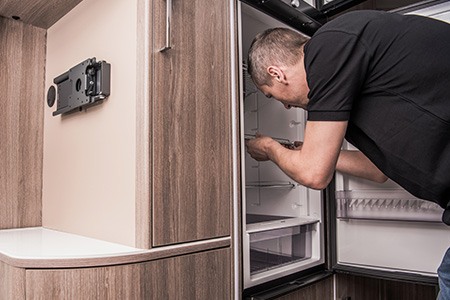
A bad start relay might potentially be the cause of the clicking noise with the fridge. If the start relay is dysfunctional or malfunctioning, you'll notice your refrigerator making a clicking noise that occurs every few minutes. The noise comes from the compressor attempting to start, failing, resetting, and trying again.
The start relay turns on the compressor using a set schedule or when the temperature inside the cooling box goes outside a specific range, causing the compressor to turn on to cool the fridge. You'll find the start relay in a small box attached to the side of the compressor. It turns on the compressor to compress the gas and cool down the unit.
If it looks like the start relay is the source of the clicking sound from your refrigerator, you can check it yourself without calling a professional to handle the issue.
Fixing a Bad Start Relay That's Making a Clicking Sound
Unplug your fridge and remove the rear access panel to find the start relay and compressor. You'll see a small black or white box attached to the compressor, and you'll have to remove it from the rear panel to access it.
Unplug the relay and gently shake it. Listen for a rattling sound. The rattling indicates you need to replace your starter relay. Visit an electrical supplier or order the part through an approved agent.
Issue #5 - Digital Refrigerator Needs Resetting
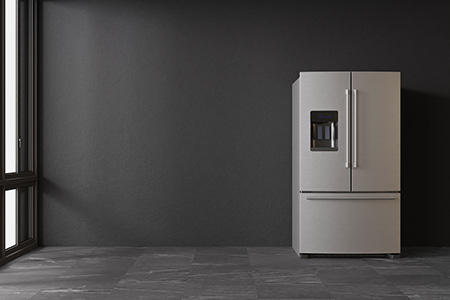
Before you assume your fridge making a clicking noise is some difficult or expensive problem, it may simply be a case of the software the refrigerator is on needing to be reset. Some fridges allow you to reset the software from the panel on the front (look up your brand and model online).
Others (like mine) have to be unplugged for a good ten minutes and then plugged back in. If you don't leave it unplugged it won't truly reset. I don't know why, I just know that every time the power goes out I have to go through this procedure or my freezer defrosts and the fridge starts clicking and won't even output any water.
Optimal Strategies for Maintaining Your Fridge
Now you know the four most common reasons why your fridge makes clicking sounds and how to fix the problem, it's time to learn how to avoid it from happening.
Maintaining your fridge is the best way to ensure long service life. Consider the correct operation of the unit. Don't back the refrigerator too far against the rear wall, or you'll limit the fan's airflow over the coils, creating overheating.
Don't place a mini-fridge on a carpeted surface. The carpet prevents airflow under the appliance, resulting in overheating and strain on the coils and compressor. If you have a fridge outdoors, open the access panel and clean the coils once a year to keep them operating efficiently.
Should You Call a Pro if Your Fridge is Making a Clicking Noise?
The most common cause of the fridge clicking is a faulty compressor. Unfortunately, you can't fix this yourself, and you'll need to call a professional. Fridge repair specialists work with all types of brands and dedicated service agents and centers for specific brands.
Before you pick up the phone, run through this list of problems and try to determine the source of the problem. It could save you an expensive repair fee. If you know what's wrong with the fridge, you can stop unethical repair services from hustling you for a costly repair fee.
Call professionals for assistance if you don't know how to repair something and have no experience handling electrical equipment. Ensure you're hiring a company with a proven track record and a good industry reputation. Check their reviews online and the testimonials. Only hire repair professionals that have a good reputation.
Ask for a quote before you approve the repair. You might be able to purchase a new fridge for the same price as a compressor replacement, especially around times of the year like Black Friday, when you'll find great deals on new models. If you find your refrigerator making a clicking noise, don't panic, just follow the steps above before you call a pro.



